Richard Curtis is
mostly known in the US for his romantic comedies. That is only
natural; the man has penned some of the great romances of the last
two decades – movies which were wonderfully British and at the same
time completely universal.
Curtis had been a
well-respected TV writer in the UK for years before his breakthrough
– writing for and/or creating classic BBC series like Blackadder,
Not the Nine O’Clock News, Mr. Bean and The Vicar of Dibley.
He had dipped his
toe into movie-making with the acclaimed but little seen comedy
The Tall Guy, starring Jeff Goldblum and a then-unknown Emma
Thompson. However, it was in 1994 that Curtis’ career exploded,
thanks to a little romantic comedy called Four Weddings and A
Funeral with Hugh Grant and Andie MacDowell.
That surprise hit
not only made a star of Curtis, but also his leading man Grant – and
the two have worked together several times since, making such films
as the smash Notting Hill (with Julia Roberts), Bridget
Jones’s Diary (with Renee Zellweger) and the ensemble comedy
Love Actually (which was also Curtis’ directing debut).
In his second
film as a director, Curtis is going a little out of his comfort
zone, downplaying the romance and working without Grant.
Instead Curtis – a self-confessed music geek – decided to make his
first rock film.
Pirate Radio
is a
fictionalized version of a real life story. In the 1960s, during
the rock and roll revolution which spawned the Beatles, the Stones,
the Who and the Kinks, the British Broadcasting Corporation (BBC)
only played one hour of rock music a week. In England the vacuum
was filled by pirate radio stations that popped up – often
broadcasting from boats in international waters just outside of the
English borders – which played the rock music that the UK craved.
Curtis put
together an extraordinarily deep cast of actors and comics like
Philip Seymour Hoffman, Bill Nighy (Love Actually), Nick
Frost (Shaun of the Dead), Kenneth Branagh, Tom Sturridge
(Vanity Fair), Rhys Ifans (Notting Hill), Rhys Darby
(Flight of the Conchords), Talulah Riley (Pride & Prejudice)
and January Jones (Mad Men).
“Working with
Richard is like being in a Richard film,” says Sturridge, who plays
the lead role of Carl – a teen sent to live on the boat by his
mother as a learning experience. “He creates an atmosphere of
family and love and safety. His set’s always very relaxed.”
A couple of days
before Pirate Radio was due to open in the US, Curtis sat
down with us at The Waldorf-Astoria in New York to discuss his film
and his career.
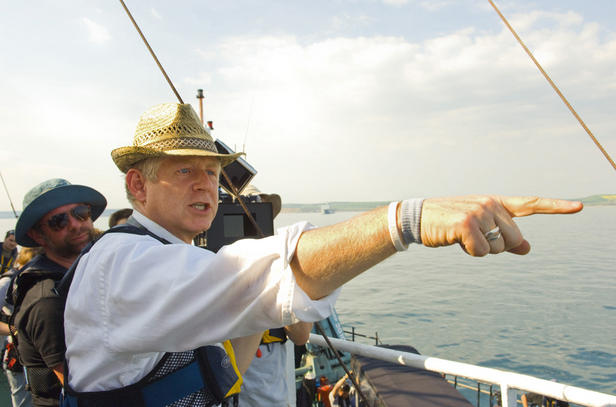 Why
this fascination for the pirate radio stations which were so long
ago… and so British?
Why
this fascination for the pirate radio stations which were so long
ago… and so British?
When I finish one film I
always start about three others. Just have a slight period where
I’m allowed to pick and choose – like a guy who’s got divorced. Not
immediately heading on. But there were a lot of things I liked
about the story. I love pop music. And I’ve thought about doing a
movie about pop music, but couldn’t come up with a story – because
I’m not really interested in the setting up a band, taking drugs
version of the pop thing. I’ve always been a fan and I remembered
the pirate radio stations. I thought, oh, that’s my kind of pop
music story. Then, I basically got really interested in the idea of
what I described to my girlfriend as “eight megalomaniacs in a
corridor.” I kind of loved this idea of taking huge broadcasting
egos and forcing them to live together. Like Leno and Letterman and
Craig Ferguson and Conan O’Brien not only have to work in the same
studio, but they have to live in the same dormitory. I thought that
was a funny idea. Then I started thinking also that in a way it’s a
film about life between 20 and 30 – which I increasingly romanticize
because I think most people when they leave university, you are
young, you end up in a grotty small apartment with six people you
don’t particularly like. One of whom has slept with everybody. One
of whom has slept with nobody, ever. Very bad food. And music. In
my case, I listened to the Specials and Madness and the Pretenders
and all of that. So it was about a lot of things I thought would be
fun and interesting.
As Richard
Curtis, the writer, you come up with this idea of making a film in a
boat. But as the director, how hard was that to pull off?
I think that the
stories of the horribleness are probably based around smaller
craft. Because I do know that Emma Thompson and January Jones both
had nasty days, because they were coming over on that little boat.
[A small boat that brought people to the Radio Rock boat.] And they
were certainly…
Threw up?
Threw up, yes.
But, it genuinely was a case of me the
writer writing the film and then handing it over to the director –
who happened to be me as well. Me the writer didn’t, for instance,
do much research. I’m not very interested in research, because that
can make you write something you don’t want to write.
Then when
I handed it over to the director, the director had to find out what
was true.
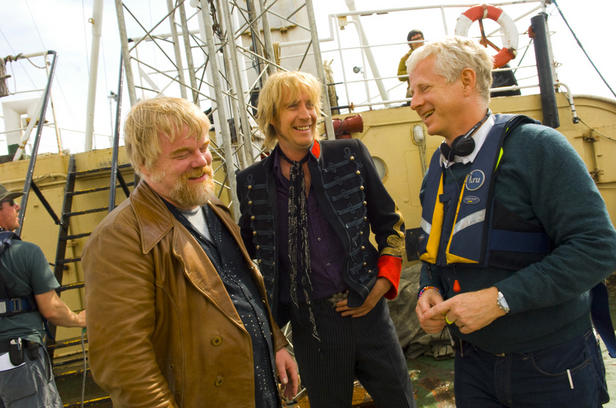 We
had a comment saying the stations were not illegal because they were
outside British waters.
We
had a comment saying the stations were not illegal because they were
outside British waters.
That’s true.
Right at the beginning [of the film], in fact, the Prime Minister
says they’re not strictly illegal. But what they were achieving was
something that against the intentions of the British government,
because there was meant to be a monopoly. I think in the 1960s they
thought that broadcasting was something that was too important to be
left to druggy, independent entities. If you were going to be going
straight into people’s homes, you better be the government. So they
were on the very edge of the law, let’s put it this way. What the
government did do was find a way of saying they were over the
edge of the law. So they came up with these specious reasons and
came up with this specious act. They passed
the Marine Defenses Act in… I think… June of 1967. One boat, Radio
Caroline, did indeed just like ours broadcast through the midnight
barrier. But those guys then had to live in Holland.
Apparently at night there was a fifteen-hour journey back
to Holland and they lived there for ten years.
I spoke with one
of the DJs at Radio Caroline and he said their boat actually did
sink in the 80s.
Oh, yeah. I
think that may be right, yeah.
It went to a 45
degree angle and the RAF (Royal Air Force) got them off just before
it sank. Did you know that when writing about the sinking of the
Radio Rock boat?
I was very aware
of photographs of a boat that was [sinking], but I thought it was on
sand. You know, that it was grounded.
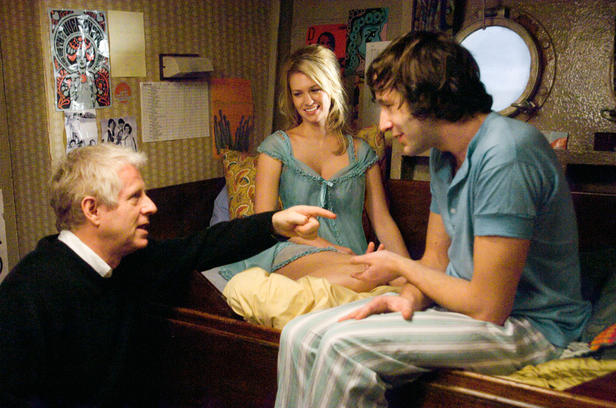 Talk
a little bit about the casting, with Philip Seymour Hoffman as the
lone American here.
Talk
a little bit about the casting, with Philip Seymour Hoffman as the
lone American here.
Well, because no
one had done the job, there were on these boats Americans and
Australians and New Zealanders, because really the English guys who
auditioned had literally made tapes in their bedrooms. I remembered
a guy very clearly called Emperor Rosko who was on Radio
Luxembourg. He wasn’t a real Emperor… I don’t think. (laughs)
I met him the other day and he’s like 60 and he wore the biggest
belt I’ve ever seen – as though he’s won the world heavyweight
championship. So, I remembered a very strong American voice and I
just wanted an Australian and a New Zealander. Sure enough, when I
went to the reunion of these things after I’d written the film,
there were lots of Australians there, actually. Casting Phil was
just brilliant. You write a film, you write your fictional
character. The casting lady comes to you with a list of people and
says, “These are the people that might be in your film.” And when I
saw Phil’s name, I went, well that’s not going to
happen. They said, “Well, send it to him. All he can do is say
no.” And he said yes.
The movie has a
lot more different songs than most movies. As a music fan, was it
like being a kid in a candy store finding songs you could use?
It was
fantastic! And fantastic during the edit. It all started, in a
way, when we were doing the end of Bridget Jones 2. Renee
was running to see Colin Firth in his chambers and I was called into
the edit and they played me three songs and said, “Which one?” I
said, well, let’s just have all three. Just go from Beyoncé to
Barry White to Robbie Williams. At that the moment I thought of
this idea – wouldn’t it be great just to have music all the way
through. Except, of course, in the government scenes. But it’s
very interesting, when you’re editing, just like
there is in casting, you think I wrote this film and twenty people
will be able to act this part. Then when you actually audition,
like we did with Tom (Sturridge), who plays Carl, it turns out they
can’t actually do it. There’s only a very limited range. When you
get to a moment in the movie, you think, well, we can put any song
there. Then you try out some of your favorite songs and it just
doesn’t work. It’s a 25 second cue and it turns out your favorite
song only gets good after 32 seconds. Or, you think your song is
very perky, but actually when you put it against something it turns
out to have a melancholy undertow which is not right. For instance,
I really wanted “Waterloo Sunset” (by the Kinks) in this
movie. But when you put “Waterloo Sunset” by anything, it’s got too
big a plot. You suddenly stop thinking about the movie and start
thinking; I wonder what happens to those guys walking across the
bridge. (chuckles) But it was great. Once in a while, we
would be curtailed by price.
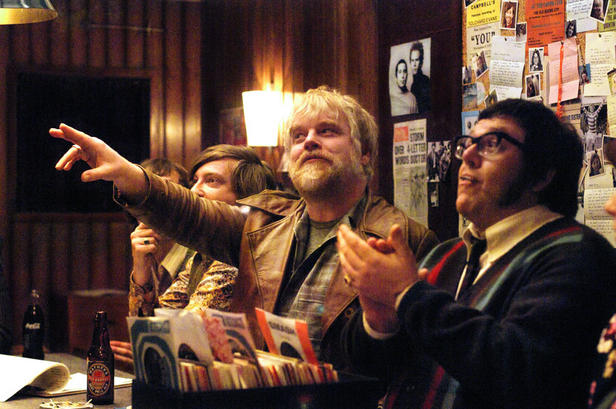 How
do you figure out the royalty prices?
How
do you figure out the royalty prices?
Well, it’s
weirdly an open market, is the interesting thing. Because they get
stuck in a moment where you say to them, well either we’ll pay you
this amount of money, or we won’t pay you any money at all. Then
they just make the choice. There is no price on tracks. They make
up the price and there’s a price they’ve gotten used to asking. I
think the Doors wanted 1.6 million dollars or something like that.
It was only a 22 second cue.
So we gave that
up…
Yeah.
Being Richard
Curtis and having this string of hits and having this reputation –
when you decide to do something, does living up to past projects
factor into it?
Not really. I
think that way madness lies. It’s always been the
prime rule that you have to do what will make you and your friends
and your girlfriend happy. That’s always been my target audience –
about eleven people. Four Weddings, which was the first
thing that made a lot of [money], it was my second film and was
sooo not expected or intended to be an international success. I
saw a bit of paper which had expected earnings and by the United
States it had zero dollars. (laughs) So, no, I think what I
want to write and then you hope it is popular.
You started out
working in television – and still you do TV work, for example (2005
BBC movie)
The Girl in the Café and I believe I heard you were writing an
episode of Doctor Who.
Yes.
Do you keep doing
TV between the hit films to keep yourself grounded?
I like working on
TV because it’s fast and because you can achieve slightly different
things. I’m doing Dr. Who because my children asked me to.
(chuckles) I did Girl in the Café because I thought
if I made it as a film, it would get tiny distribution – whereas it
was shown on BBC1 and five million people saw it on the same day.
So, I’ve never felt the slightest bit snobby about TV. I absolutely
love TV and I think much of the best work being done creatively is
on TV.
Which Doctor are
you working with?
I worked with the
new Doctor, Matt Smith. I think I’m episode ten of series one of
Doctor nine.
 What
can you say about how the character is being developed?
What
can you say about how the character is being developed?
Well, they
stubbornly say the character is the same. Interestingly, they said,
“don’t think about writing for him. The Doctor is the Doctor. He’s
keen. He’s enthusiastic. He’s overconfident. All of those kind of
things.” So, I haven’t really adapted it for him. I’ve seen now
the performance that he’s going to give. We’ve had read throughs.
And it is interesting that strangely there are great consistencies
between the performances, even though they are very, very different
in color. So I really tried to write for Doctor Who rather than…
he’s actually not called Doctor Who, he’s called The Doctor.
This is the first
movie that has Ken (Branagh) and Emma (Thompson) in it since their
rather bitter divorce.
Yes. When I
asked Emma to do it, I sent it to her. She said yes. Then I had to
ring her up and say Ken is going to be in the movie.
But you’re not in
any scenes with him…
You know, when
she came in to do her ADR (dubbing) she specifically asked to see
Ken’s scenes and just roared with laughter all the way through. So
I think it’s okay now. (Or) Maybe she was laughing at how old he
now looked (laughs) with his mustache. Maybe it was
malicious laughter. But, no, I didn’t have any problem there.
The film
celebrated friendship. It was about finding alternative families.
Was this sort of a step away from the tone of your romantic films
you have been doing?
I love you saying
“the alternative family,” because that is the story with Carl. The
friendship thing actually, when I look back, in fact has been… these
aren’t inconsistent things. In some ways, Four Weddings is
more a film about Hugh and his friends. Indeed, Notting Hill
is sort of about it – and the ties in Love Actually. I think
as far as comedy is concerned, friendship probably is my central
inspiration, because, when people say, “Is it tough writing comedy,”
I think, well, very little that I’ve written has ever been as funny
as what happens around the table with any of us. With our six best
friends, at 10:30 at night, slightly drunk when you’re cracking
jokes – both about each other and about the world. That’s, in a
way, what I’m always aiming for in dialogue. That sense of freedom
and looseness and jokes. I’m very interested in friendship. Maybe
I’m more interested in friendship now, as when I look at my life
with four children and two jobs, the thing I’ve sacrificed is
friendship. I’m profoundly aware of the fact that that’s been the
third that I’ve lost. So maybe this is a nostalgic desire to have
six months to make new friends. Maybe starting now! (laughs)
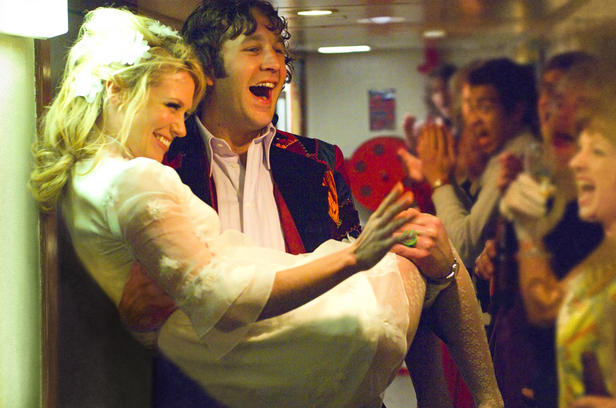 Is
it because you don’t have time for friends, or just because you
don’t like other people so much?
Is
it because you don’t have time for friends, or just because you
don’t like other people so much?
Yeah. I think
genuinely because they’ve all got families, too. They’ve all got
different priorities. They go places on the weekends. When you’re
in trouble, you go to your girlfriend or to your friend, “I’ve got
to be home at six to put Spike to bed.”
How old are your
kids?
Fourteen,
twelve. They’re all just having birthdays. Six and eight.
Are they at the
point where they want to be in dad’s films – at least in a cameo?
They’re all in
this movie. They’re all in it. They’re just jumping up and down on
a bed, playing air guitar at the beginning. Not particularly.
Scarlett is more interested in whether or not I can introduce her to
Taylor Swift. That’s her main interest. Jake is in a band now.
He’s just learned how to play “Ziggy Stardust.” Spike wants to be
Michael Jackson. I’m taming his hopes there.
Does he have a
favorite Michael Jackson song?
Actually, his
favorite two songs are “U Can’t Touch This” by MC Hammer – he does a
dance where he wears his pajamas very high and then he pulls down
his pajamas almost to his willie. And then he loves “Smack That” by
Akon and Eminem. And every time he says “smack that,” he smacks his
bottom. So there we go. (laughs) He’s going to have a
troubled life.
In England, the
movie was called
The Boat That
Rocked. Why was the title changed for the US?
I was flexible.
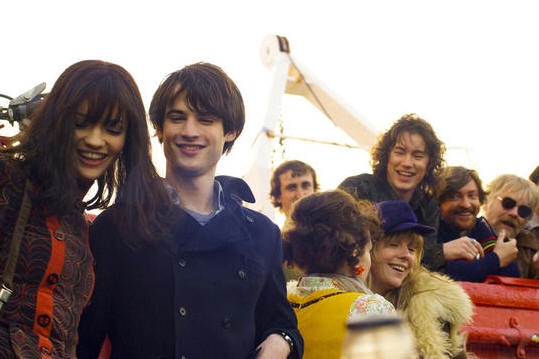 And
it was thirty minutes longer.
And
it was thirty minutes longer.
Well, it was
fifteen minutes longer, really. I’ll talk about both of those
things. Because Focus (Features) took it over and was very
enthusiastic, I just said to them look, if you want to look at any
different titles, do, because I’m sort of used to that. In France,
it was called Good Morning, England. Very weird.
(laughs) Well, not what they called it in English, a different
name, but an English name. (Focus) came straight back with this –
which is not a name we would have used in the UK, because it would
have been like calling it The Post Office or A
Supermarket. It’s sort of generic there, but I thought it was a
cool title. I loved having the word “pirate” in it and that’s what
it was about, so I was happy about that. The cutting was… in the
original, because we filmed the film in a very loose way, with
cameras on shoulders. Not with agreed close-ups or camera on
tripods. We over filmed massively, so the original film cut of the
movie was like five hours long. So, I was used to making this film
shorter. And a few reviews in England did say that it’s a bit
long. I realized that I hate that when they say it about movies. I
never saw Watchmen. I never saw Dark Knight. These
were movies that I really wanted to see. But that… it’s a seed of
doubt. I didn’t want that seed of doubt, so I just went in one day
and took out the time in one day – and then I fixed it for a
week.
Talulah (Riley)
said that she was a little bit mystified by her character acting
like she did (sleeping with a DJ while on a date with another man on
the boat.) I heard that your response was, “It’s the sixties.” Can
you talk about the change of attitudes?
I know women who
were very like that, so I think that may be particularly Talulah’s
take on it. Look, I wasn’t trying to make a message about…
Free love…
Free love,
exactly. I think I was more thinking of… I had a friend, a
babysitter called Hermione, I remember in the 60s, who got a job in
the Foresta Hotel in Sweden three months before the Beatles turned
up, just so that she would eventually be able to have sex with one
of the Beatles. She didn’t mind which one.
But they were
rock stars, not DJs.
Well, I know, but
these DJs were sort of rock stars in their own world.
Did it happen for
Hermione?
She might have
had sex with a roadie. I don’t recall. She didn’t have sex
with Brian Epstein.
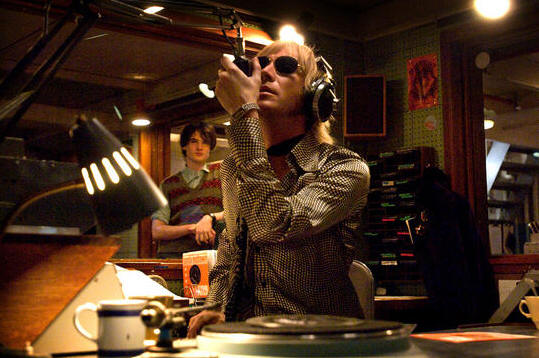 The
cook was the only woman living on the boat, but she was a lesbian.
What was your thought about developing her as a character?
The
cook was the only woman living on the boat, but she was a lesbian.
What was your thought about developing her as a character?
Because I was
very aware that I was writing a movie where there were only boys, I
wanted a girl. Originally, I wrote a long sort of audition
process. I said we are looking for a gay cook. Lots of
heterosexual girls applied. They did all sorts of tests.
(laughs) Then I found somebody who was genuinely gay. So, by
that time, I was so attached to the idea of having a girl on board.
Then what I liked about it was the very fact that we made no fuss
about it, whatsoever. She was just treated like one of them all,
but she had a sort of sweet and delicate nature. In fact, my
favorite shot in the film was the shot of the girl she falls in love
with – when they both look at each other at that moment. It was one
of those frustrating things where it was the prettiest shot we took,
and every time we got to it (in editing) I said can we have a few
more frames. And every time we looked at it again and she blinked,
so we couldn’t have any more.
What did you eat
on the boat?
Normal catering.
It was genuinely, I think that if you ask the actors, they will all
say they don’t remember being in the studio, because the boat
experience was so delightful. We set up at 7 every day with music
playing very loudly over speakers on board. We had the catering in
the kitchen area. So, it was just like normal. There were a lot of
muffins and coffee.
Do you know what
you want to do next?
I’m in that
choosing three area. There are about three that I’m working on now
– one of which is more like The Girl in the Café. One of
which is like the sort of last film I’ll ever make – my meaning of
life film.
Is it serious?
No, no, no.
The Girl in the Café type one is serious. The other one is
half-serious. The meaning of life is a nice thing, it’s not deep.
But why would it
be your last?
Well, no. I
think in a way, you should always make each film as though it’s
going to be your last, you know what I mean? Just so you think:
well, if I were only allowed to make one more film, which one would
it be?
And it’s a crazy
business, you never know with financing what could happen…
Yeah, I mean if
my Doctor Who episode goes well, that could be a job for
life. (laughs)
Email
us Let us know what you
think.